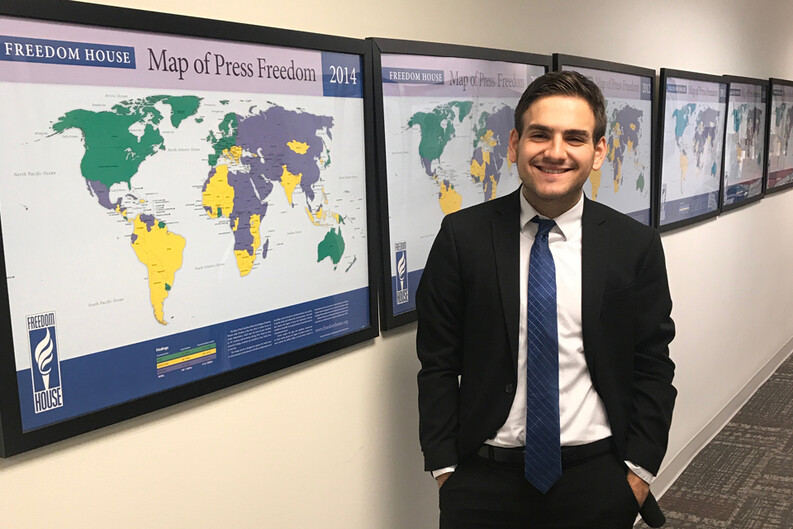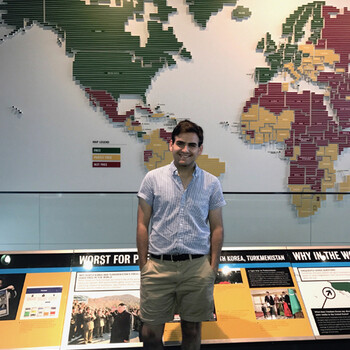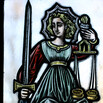Yale Junior Spends Summer Learning about Democracy Promotion at Freedom House

Michael Borger YC ’20 is a junior in the undergraduate Multidisciplinary Academic Program in Human Rights. As a Kirby Simon Fellow, Michael spent the summer interning at Freedom House in Washington D.C. Freedom House is an independent watchdog organization that promotes and defends political rights and civil liberties around the world by supporting civil society organization and human rights activists, advancing democratic change through collaboration with members of civil society, and conducting and publishing research on freedoms around the world. Michael described his experience working in the Latin America and the Caribbean Program at Freedom House to the Schell Center.
When I entered Freedom House’s office on my first day, I immediately noticed an Eleanor Roosevelt quote on one of the glass panels in the conference room. It read, “It is better to light a candle than curse the darkness.”
I knew I would only be at Freedom House for a short time and that it would be challenging to work to provide greater clarity on the transgressions committed by different regimes and the trials faced by citizens exercising their most fundamental rights – that these problems would feel too dau

My time at Freedom House was very meaningful. I gained a better understanding of complex regional human rights situations from local media outlets, communicated with important policymakers and organizations, and discovered new ways of conducting advocacy locally and remotely. I learned so much from the Program’s various initiatives, which ranged from ensuring the efficacy of protection mechanisms for journalists to instructing activists on how to document human rights violations to increasing awareness of crackdowns on civil society.
As an intern, I provided programmatic, logistical, and research support to the Latin America and Caribbean Program. The Program covers several countries, including Honduras, Venezuela, and Cuba, and I was assigned different projects according to the Program’s needs and the urgency with which they had to be completed. My tasks included everything from collecting short news roundups from regional media outlets to helping organize public and private events with human rights advocates, policymakers, and scholars. I researched strategies for effective political mobilization in countries where populations have become desensitized or silenced due to continual repression and violence. I wrote briefs on the tactics different authoritarian regimes employ to subdue dissent and consolidate their rule, such as concentrating power in family and crony networks and delegitimizing the judiciary and members of the press. Studying democratic backsliding allowed me to see how entwined the protection and fulfillment of human rights are with transparency, good governance, the separation of powers, and free and fair elections.
With the Program team, I assisted social movements, civil society organizations, and human rights defenders in Nicaragua, Ecuador, and other Latin American countries. I encountered activists who had faced obstacles to exercising their rights to free speech and peaceful assembly; who had been illegally and arbitrarily detained; who had confronted the use of unnecessary and excessive force by government and paramilitary groups. Freedom House experts use the latest data and research to help such activists strategize and build their capacity by collaborating with local international actors, evaluating the risks involved in protests, etc. I participated in these efforts by researching how regional and international human rights systems, such as the Inter-American System and the United Nations, have responded to humanitarian crises and helped to guarantee freedoms in the past. This research proved valuable in suggesting further recourses available to human rights defenders who feel that domestic remedies have been unable or unwilling to redress grievances.
The projects and discussions I had the chance to participate in at Freedom House helped me see how to implement the human rights theories and documents I have studied in the classroom. I got to channel my background in Model United Nations into reports for Freedom House and, by writing translations and briefs, I honed the Spanish skills I have developed over two years at Yale. I also learned that to successfully promote democracy in the real world, it’s crucial to meet local demands, work with on-the-ground organizations, and recognize the unique ways in which each country operates.
My summer at Freedom House motivated me to learn more about effective approaches to democratic development and reinforced my desire to attend graduate school in law or public policy and work with civil society organizations on defending political and civil liberties and improving human rights conditions in Latin America.


